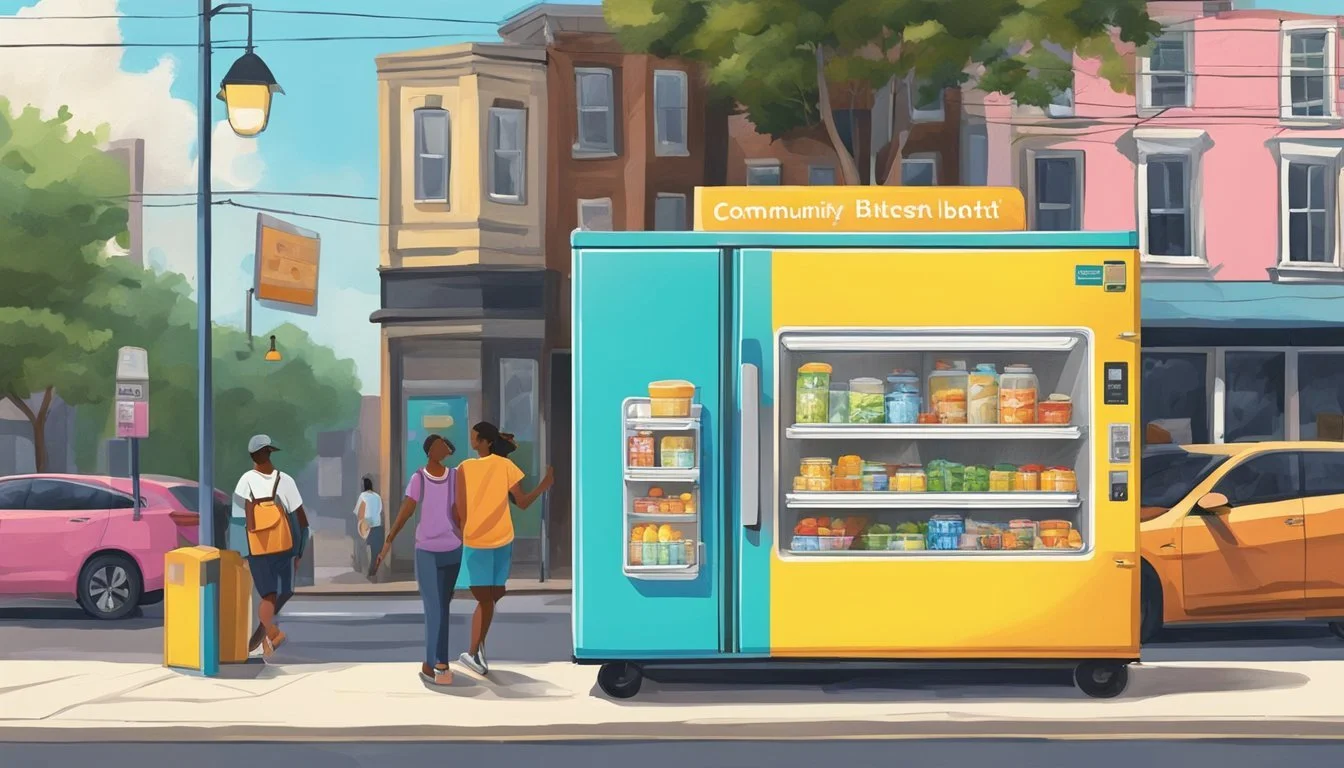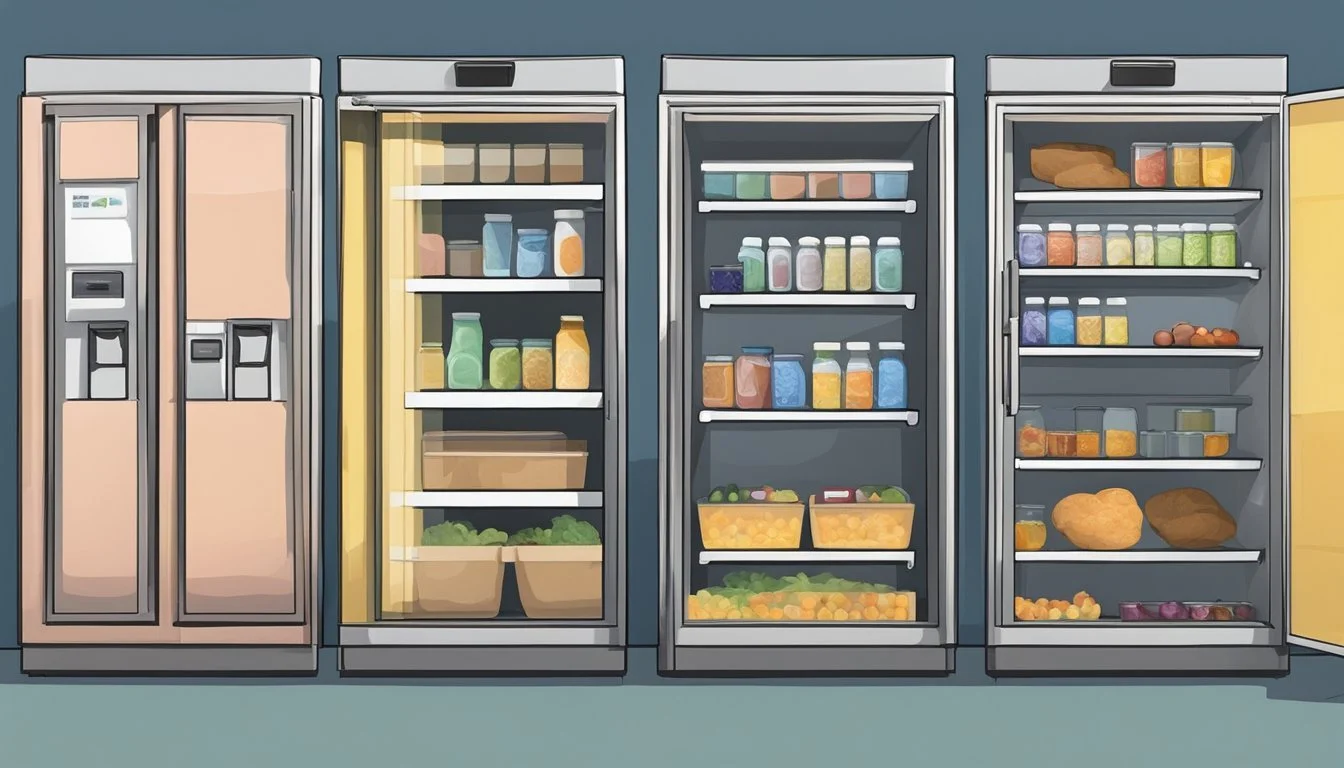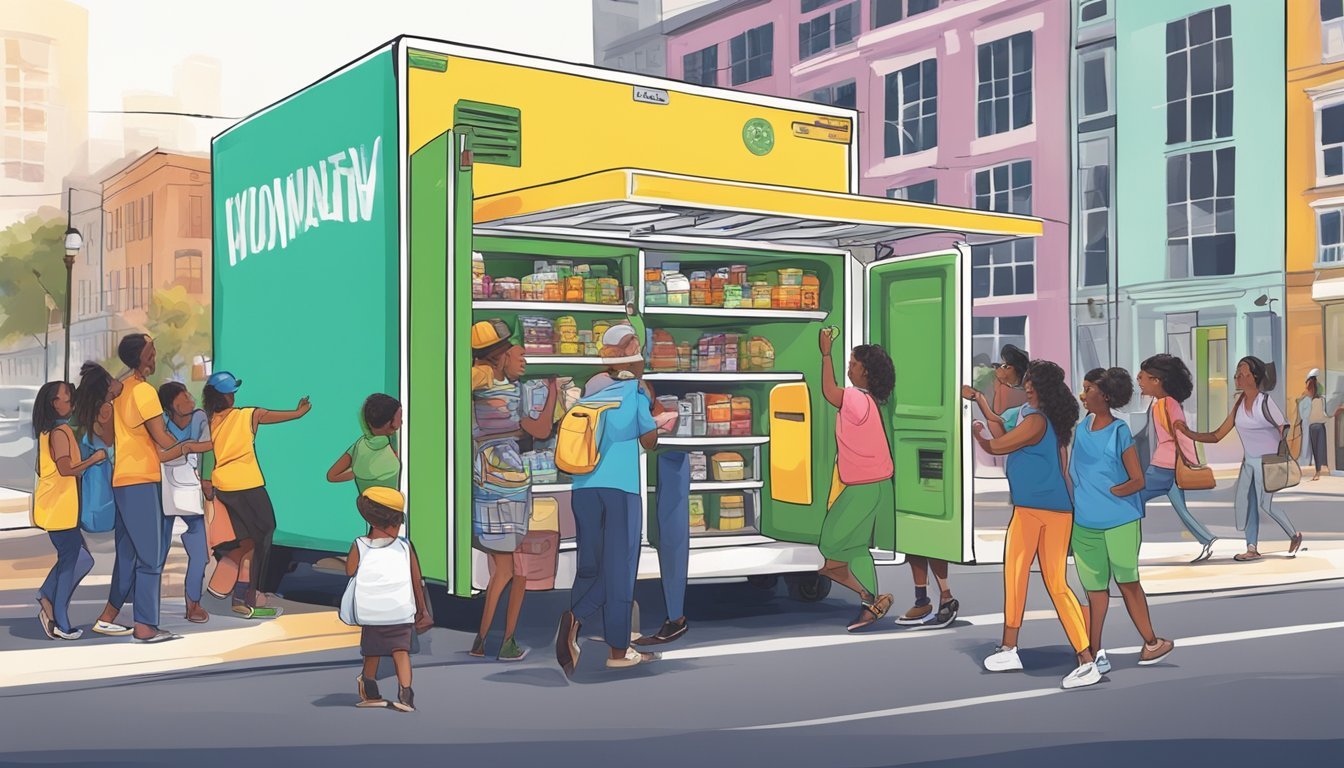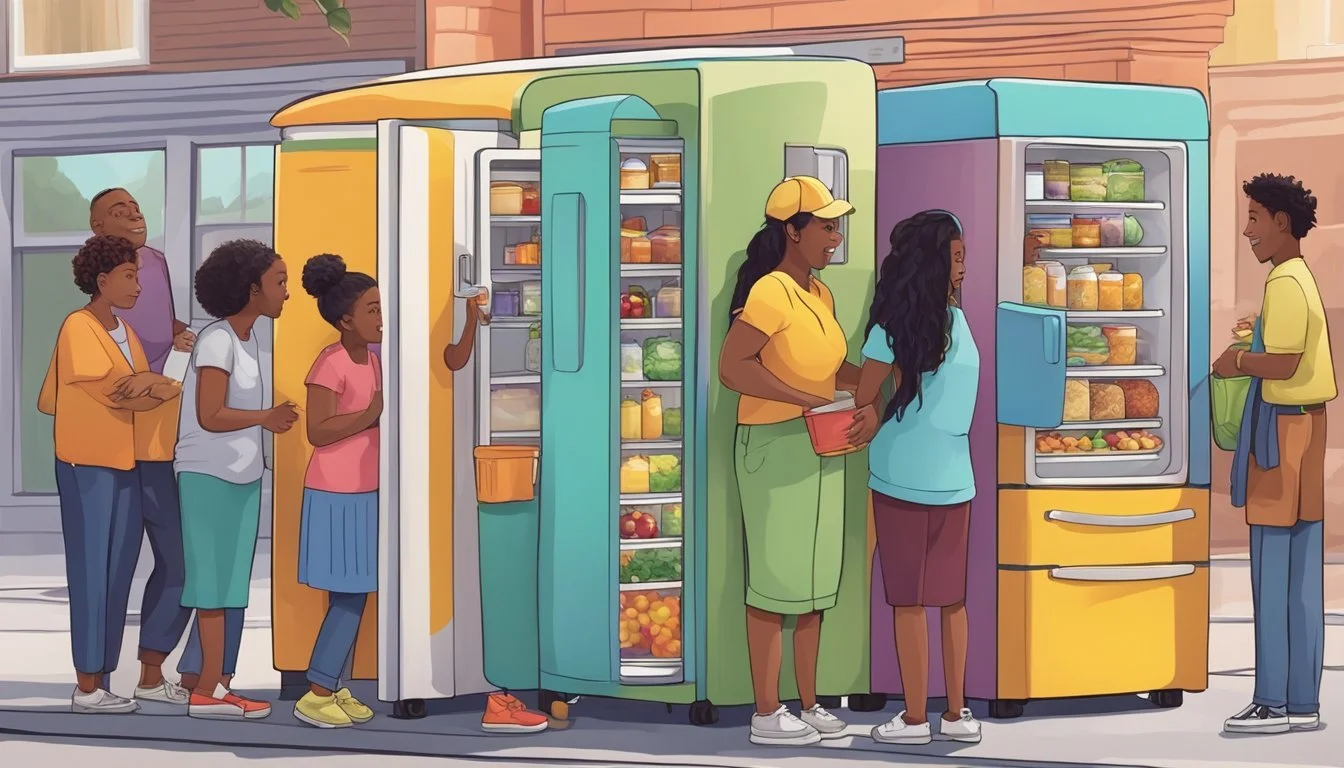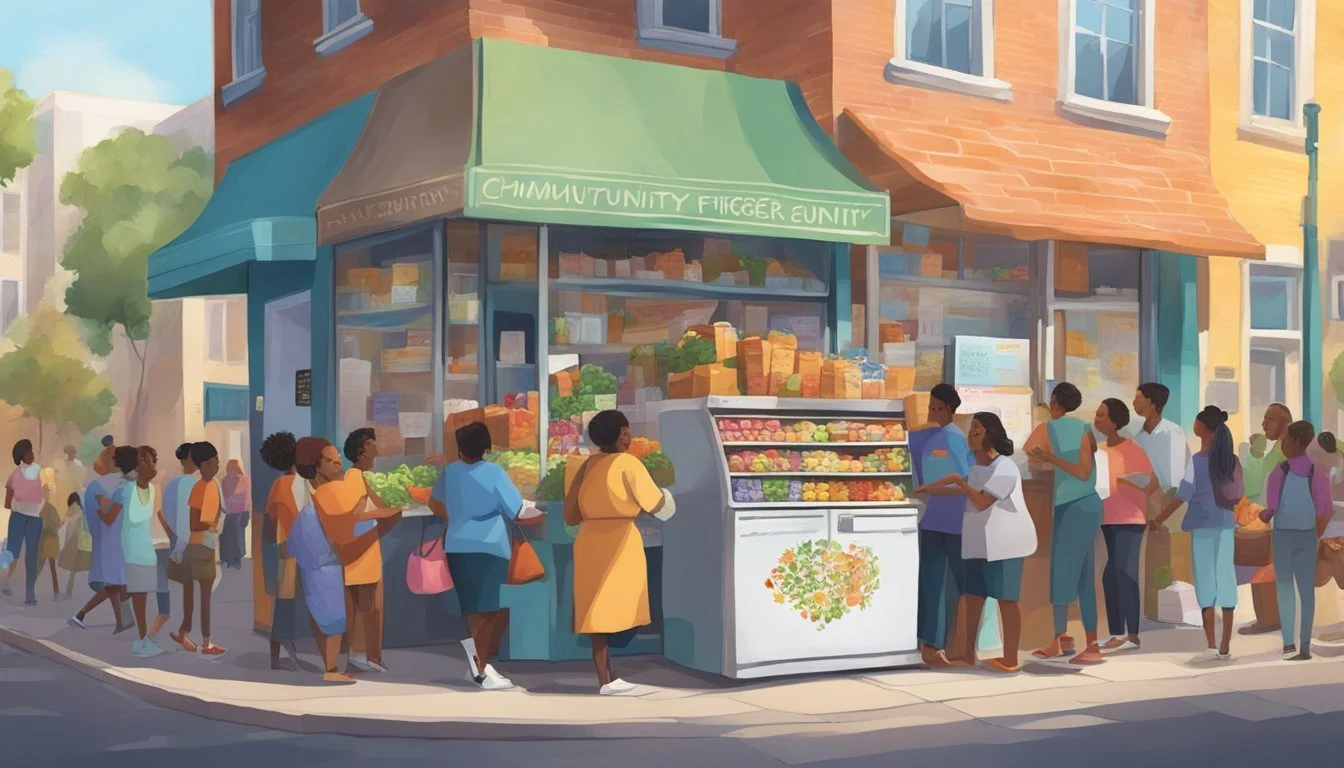Mobile, AL Community Fridge
Tackling Food Insecurity with Compassion
Community fridges are a testament to grassroots initiatives aimed at tackling food insecurity and waste in an inclusive and community-oriented way. In Mobile, Alabama, these refrigerators, which are placed in accessible locations, offer a place where individuals and businesses can leave surplus food for those in need. They function on a simple but profound premise: Take what you need, and leave what you can. Not only do they provide free access to food, but they also foster a sense of solidarity and mutual aid within the community.
The concept of a community fridge might seem modern, but it taps into long-standing traditions of communal sharing and support. In Mobile, the presence of community fridges serves as a reminder that food is a shared resource, and that sustainability can be integrated into daily life. They operate on the generosity of local residents, businesses, and even farms, with regular donations ranging from fresh produce to prepared meals. This not only helps reduce food waste but also ensures that nutritious food reaches those who might otherwise go without.
These fridges offer a decentralized solution to food insecurity, allowing anyone to contribute to the community's well-being without the need for extensive background checks or paperwork. In times of increased economic uncertainty, community fridges in Mobile stand as pillars of hope and solidarity, providing a reliable source of sustenance to all community members, regardless of their circumstances.
Understanding Community Fridges
Community fridges are grassroots solutions aimed at tackling food insecurity and food waste by fostering a spirit of sharing and community support. They operate under the ethos of food justice, ensuring access to nutritious food is considered a universal right, not a luxury.
Definition of Community Fridge
A community fridge is a publicly accessible refrigerator where individuals and businesses can donate perishable and non-perishable food items and where anyone in need can take them free of charge. These fridges are typically located in community spaces with high foot traffic to maximize their accessibility. They run on mutual aid, where the community collectively stocks and maintains the fridge, and operate with the goal of food justice, providing equitable food access to all.
History and Evolution
Community fridges originated as a response to food insecurity, where communities recognized the necessity of taking action into their own hands. They emerged from the concept of mutual aid and have become symbols of unity and community resilience. Initially, there were only a handful of community fridges, but they have rapidly evolved. For example, the Freedge organization noted an increase from 12 community fridges in the US in March 2020 to over 160 across 28 states.
Community Fridge vs. Traditional Food Banks
Community Fridges Traditional Food Banks Accessible 24/7 with no restrictions or qualifications. Often have specific hours and may require proof of need. Promote a “take what you need, leave what you can” philosophy. Provide food parcels or meals based on standardized assessments. Revolve around the principle of anonymity and dignity, allowing individuals to use them without any formal process. Users typically need to register and sometimes may face stigma or feel a loss of dignity.
Community fridges are distinct from traditional food banks in their approach to food insecurity. They offer an informal, decentralized alternative that emphasizes community building and immediate, barrier-free access to food, thereby directly contributing to the reduction of food waste. These fridges are not only a stopgap but also a radical act of food justice, challenging the traditional dynamics of food aid and charity.
Significance of Community Fridges
Community fridges serve as a vital resource for addressing food insecurity and reducing food waste. These communal appliances offer immediate support through free food while embodying food justice principles.
Addressing Food Insecurity
Community fridges in Mobile, AL, provide direct relief to individuals and families facing food insecurity. They ensure that free food is available to those who might otherwise go hungry. Volunteers play a crucial role in maintaining these fridges, ensuring they are regularly stocked with nutritious food. Their efforts are foundational to the success of these initiatives, which not only feed the hungry but also promote food justice by equalizing access to sustenance.
Key Aspects:
Free access to food for residents
Volunteer involvement crucial
Reducing Food Waste
Community fridges also tackle the issue of food waste. By allowing individuals and businesses to donate surplus items, these fridges ensure edible food is used rather than discarded. This approach helps to reduce food waste significantly, turning potential waste into meals for those in need. The fridges act as a hub for these transactions, making it simple and efficient for community members to participate in a more sustainable food system.
Strategies:
Encourage donations of surplus food
Transform potential waste into valuable resources
How to Participate
For those interested in supporting the Mobile, AL Community Fridge, there are several ways to get involved, from donating food to dedicating time as a volunteer. Each action contributes to the sustainability and success of the initiative, providing essential services to the community.
Donating to a Community Fridge
What to Donate: The community fridge in Mobile, AL accepts perishable and non-perishable food items that are within their expiration dates. Individuals can donate fresh produce, packaged goods, and other unopened items suitable for consumption.
How to Donate: Donations can be directly placed in the fridge or coordinated with local volunteers for proper storage. Monetary donations to support the operation can be made through platforms such as CashApp, Venmo, or GoFundMe.
Volunteering at a Community Fridge
Roles Available: Volunteers can assist with organizing the fridge, monitoring food safety, and cleaning. They ensure that the donations are accessible and the space is hygienic.
How to Volunteer: Individuals can join a network of volunteers by signing up through the community fridge's website or contacting the organizers directly.
Starting a Community Fridge Initiative
Collaboration with Local Businesses: Engage local businesses for sponsorships or as steady donation sources to ensure a consistent supply of food.
Guidance and Procedures: Establishing clear guidelines regarding food safety, maintenance, and operation is crucial for the initiative's longevity. It's helpful to create a schedule for volunteers and provide training on food handling and storage practices.
Impact of Covid-19 on Community Fridges
During the Covid-19 pandemic, community fridges in Mobile, AL became critical in addressing food insecurity. Volunteers and donations played vital roles in keeping these fridges stocked.
Challenges Faced
The advent of the coronavirus pandemic brought numerous challenges to community fridges. Initially, there were concerns about how to safely operate these resources without contributing to the spread of the virus. Volunteers needed to implement new safety protocols, including regular sanitization and social distancing, which sometimes limited the number of people who could manage the fridges at any given time.
Food insecurity surged as unemployment rates climbed due to lockdowns and economic slowdowns. The fridges faced unprecedented demand while the usual flow of donations was disrupted. Additionally, supply chain issues made it challenging to keep fridges consistently stocked with fresh produce and other perishables.
Response to Increased Demand
In response to the heightened need, community fridges in Mobile expanded their operations. Volunteers stepped up their efforts, organizing donation drives and coordinating with local businesses and restaurants to secure food contributions. They worked tirelessly to restock the fridges and ensure access to those in need.
The response went beyond just maintaining existing fridges. New fridges were established to cater to the increased demand, often with a focus on neighborhoods hit hardest by the pandemic. Community organizations and individual donors recognized the importance of supporting these initiatives, leading to an increase in both donations of food and funds, solidifying community fridges as a cornerstone in the local response to the Covid-19 pandemic.
Supporting Organizations and Movements
Efforts to alleviate food insecurity in Mobile, Alabama, involve a network of grassroots organizations and local businesses, complemented by collaboration with national and global networks. These entities play pivotal roles in operating and sustaining the community fridge initiative.
Grassroots Organizations and Their Roles
Grassroots organizations are crucial in establishing and maintaining community fridges. They handle the logistics of sourcing and distributing food, engaging volunteers, and ensuring the fridges are stocked and clean. Mutual aid groups specifically, operate on principles of solidarity, aiming to meet the immediate needs of the community through resource sharing.
Partnerships with Local Businesses
Local businesses often offer support by providing food, logistical assistance, or financial contributions. These partnerships not only ensure a consistent supply of food but also embed the community fridge initiative within the local economy. Some businesses directly host a fridge, while others contribute through coordinated food drives or donations.
National and Global Networks
The community fridge in Mobile benefits from its association with wider networks like Feeding America, which helps with food supply through their extensive food bank network. Additionally, global movements promote the concept of food sharing and provide support structures for these types of mutual aid initiatives. This networking can mean access to best practices, additional resources, and increased visibility.
Community Engagement and Edu
Mobile, Alabama's community fridge initiative exemplifies the city's commitment to unity and food justice through sharing and education. This program not only addresses food scarcity but also fosters a sense of community and empowerment among residents, particularly within communities of color.
Building Community Through Sharing
The community fridge in Mobile serves as a beacon of collective responsibility and support. It operates on a straightforward principle: take what you need and leave what you can. This system is instrumental in building trust and unity among neighbors, providing a shared space where the exchange of resources is guided by compassion and communal welfare. Volunteers play a vital role in maintaining the fridge, and their tireless work ensures that this community resource remains stocked and clean.
Benefits of the Community Fridge:
Encourages sharing and reduces food waste.
Provides accessible nutrition to underserved communities.
Strengthens local connections and supports mutual aid efforts.
Educational Campaigns and Workshops
Educational efforts in Mobile are integral to the success of the community fridge. Workshops and informational campaigns educate residents on nutrition, food safety, and the importance of community involvement. These educational programs aim to promote long-term sustainability and empower individuals with the knowledge to make informed decisions about their health.
Educational Initiatives Include:
Nutritional literacy workshops to encourage healthy eating habits.
Training on food safety and proper handling to maintain the quality of shared resources.
Sessions to inspire and equip residents with the skills to contribute through volunteering.
By fostering a supportive environment for volunteers and facilitating knowledge-sharing, Mobile strengthens its communities and champions food justice.
Success Stories and Models
The rise of community fridges serves as a beacon of hope and solidarity, showcasing how a simple yet powerful idea can take root and flourish in diverse settings. These refrigerators, powered by community participation and kindness, are not just addressing food insecurity, but also fostering a sense of unity among residents.
Community Fridges Across America
In New York City, the Friendly Fridge has become a symbol of mutual aid, where community members both give and receive freely. This model of a self-sustaining food sharing system has been replicated in various neighborhoods, each fridge with its unique decor reflecting the local vibe and community spirit.
Los Angeles has witnessed similar success with LA Community Fridges, a network run entirely by volunteers. The city's open-access fridges provide fresh food and an opportunity for residents to contribute and take responsibility for the well-being of their neighbors.
Atlanta's approach has underscored the importance of community fridges in urban settings. They provide not only sustenance but also a platform for local artists and activists to engage with the community through food.
Boston has followed suit, with multiple fridges set up throughout the city. These fridges operate both as standalone entities and as part of larger community support systems, reinforcing the solidarity within neighborhoods.
Global Inspirations
Looking outside the United States, Berlin stands out with its own network of community fridges. Fridge initiatives in Berlin have succeeded by adhering to strict hygienic standards and engaging with local food businesses for regular contributions, demonstrating the effectiveness of community involvement in a European context.
Moreover, the global influence is seen in the flow of ideas and models between countries, where community fridges have often adopted best practices from one another regardless of geographical boundaries. This cross-pollination has led to improved systems for managing donations, engaging volunteers, and ensuring that the fridges remain stocked with nutritious food options.
Challenges and Controversies
Mobile, Alabama's Community Fridge initiative aims to alleviate food insecurity, yet it faces several challenges and controversies that affect its operation and effectiveness.
Sanitation and Health Concerns
Sanitation is paramount in food sharing initiatives like community fridges. In Mobile, maintaining food safety standards is a constant challenge. Volunteers must ensure that donated items are not expired, spoiled, or contaminated, to prevent foodborne illnesses. They also need to regularly clean the fridges to comply with food safety regulations and keep pests at bay, which can become problematic when resources or volunteers are scarce.
Legal and Bureaucratic Hurdles
The operation of community fridges in Mobile must navigate legal and bureaucratic hurdles. Local health regulations may require permits, and there's a liability for the food's safety once it's offered to the public. These legalities can deter potential sites from hosting a fridge, impacting the number of fridges available to those in need. Additionally, potential zoning laws may restrict where fridges can be placed, further complicating accessibility.
Future Outlook
The Mobile, AL Community Fridge project eyes a promising horizon, aiming to harness cutting-edge technology and broaden its network to tackle food insecurity and minimize food waste more effectively.
Innovation and Technology in Community Fridges
Community fridges in Mobile are expected to adopt innovative technologies to enhance food preservation and safety. Smart monitoring systems could be integrated to track food stocks in real time, sending alerts to volunteers when supplies are low or when donated items are nearing expiration. By incorporating solar-powered fridges, they aim to reduce operational costs and ensure sustainability.
Expanding Access and Networks
The project plans to expand its reach by increasing the number of fridge locations, which will operate as crucial nodes in a broader network combating food insecurity. They will focus on strategic placement in neighborhoods with limited access to groceries, amplifying the impact. Partnerships with local farms and businesses are also on the agenda, aimed at securing a steady flow of donations, thus tightening the community bonds and reaffirming the unity in the fight against hunger.
How You Can Help
Supporting the Mobile, AL Community Fridge initiative is crucial to its success, and there are several ways individuals and corporations can contribute. From donating fresh produce to volunteering time, every action helps to provide free, healthy food to those in need.
Individual Actions
Individuals interested in supporting the community fridge can take several concrete steps. They can donate items such as fresh produce, canned goods, bottled water, and healthy, home-cooked meals. It's important to ensure that food donations are non-perishable or fresh to prevent spoilage. Additionally, individuals may volunteer their time to manage the fridge, organize food drives, or clean and maintain the space.
Donations: Consistently needed items include:
Fresh fruits and vegetables
Sealed, non-perishable goods
Bottled water and healthy drinks
Volunteering: Opportunities to get involved include:
Stocking and cleaning the fridge
Coordinating food collection
Spreading awareness in the community
Corporate Social Responsibility
Local businesses, growers, and restaurants play a vital role in sustaining the community fridge. They have the unique capacity to donate surplus fresh food and household items on a larger scale. Establishments can establish a corporate social responsibility (CSR) program to facilitate regular donations, which can significantly impact the community's access to healthy food.
Local Businesses:
Commit to regular donations of perishable and non-perishable items.
Encourage staff to participate in volunteering efforts.
Growers and Local Restaurants:
Share excess fresh produce and prepared foods to promote healthy eating.
Partner with the community fridge to host food sharing events.
By taking action, whether as an individual or a business, the community of Mobile can ensure that its community fridge remains a reliable resource for those who need it most.
Additional Resources
Mobile, Alabama's efforts in reducing food waste and supporting its community are bolstered by the presence of community fridges, also known as 'freedges'. Freedges function as a mutual aid resource, where surplus perishable food, which would otherwise contribute to landfill buildup, is made available to the community members who need it most. These initiatives encourage local participation and offer a simple yet effective approach to address food scarcity challenges.
A freedge typically operates on an honor system, ensuring that the help reaches those in need without the barriers of paperwork or bureaucratic procedures. Not only do these resources minimize food waste by redistributing excess food, but they also create local employment opportunities and community cohesion.
Table of Mobile, AL Freedge Locations:
Location Contact Information Notes 3100 Cottage Hill Road Not provided Building 4, Suite 400 515 Springhill Plaza Court (251) 461-4146 Alabama Career Center, Job Aid
Community members should also note the potential for volunteering or contributing to these fridges. Whether by donating food, time, or simply spreading the word, every little bit counts towards the larger goal of ensuring no one in Mobile goes hungry while reducing overall food waste.
Local organizations may provide additional resources, like job listings and bill assistance, that are invaluable to those facing various hardships beyond food insecurity. These combined efforts foster a stronger, more sustainable community, directly confronting the issues of hunger and environmental sustainability.
Conclusion
The Mobile, AL Community Fridge embodies both unity and practicality in addressing food insecurity. It operates as a vital resource for residents, offering free access to food and reducing food waste through communal participation. Individuals can donate food items, ensuring shelves are continually stocked for those in need.
Efficient management and local engagement are key. The community fridge is more than just a place for food exchange; it represents a collective effort to foster support and solidarity within the neighborhood. With every item donated, the community takes a proactive step against hunger.
The success of Mobile's Community Fridge can serve as a model for other cities. Herein lies a sustainable approach to mitigating hunger:
Reducing waste: By repurposing excess food.
Encouraging donations: A shared responsibility among residents.
Building community: Strengthening local ties through acts of giving.
Mobile's initiative serves as an inspiring testament to what can be achieved when a community unites for a common cause.


